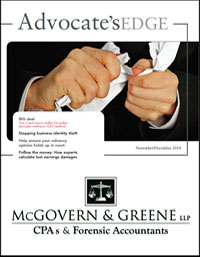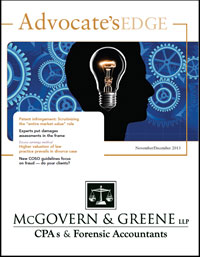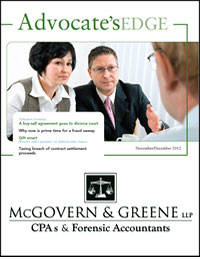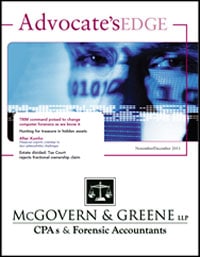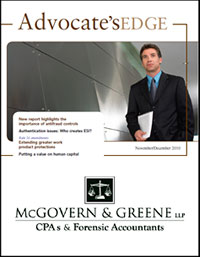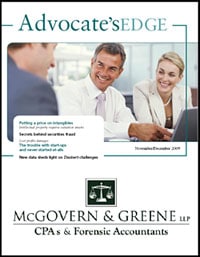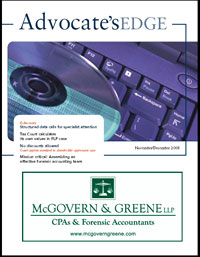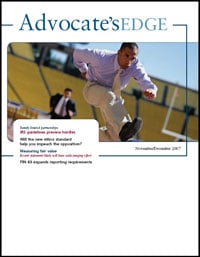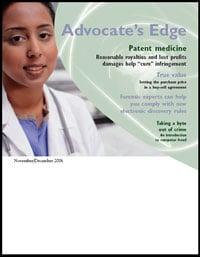Advocate’s Edge
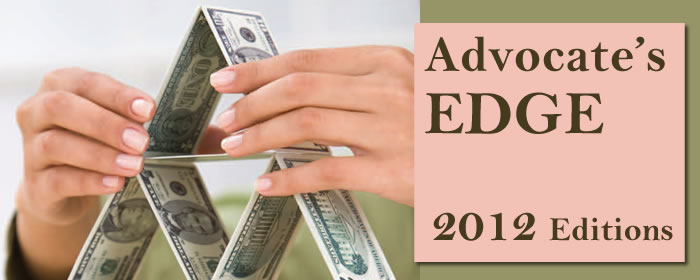
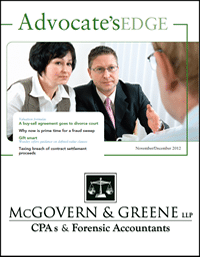 NOV/DEC 2012 Issue of Advocate’s Edge
NOV/DEC 2012 Issue of Advocate’s Edge
Valuation formulas
A buy-sell agreement goes to divorce court
Closely held businesses commonly rely on buy-sell agreements to facilitate liquidity and smooth ownership transitions. But the agreements also occasionally play a part in divorce proceedings. This article looks at one such case, in which a Missouri appellate court rejected a buy-sell agreement’s valuation formula as the basis for valuing the business in the divorce settlement. It shows why, depending on the jurisdiction, an enforceable buy-sell agreement should provide for an up-to-date appraisal. A sidebar lists the benefits of a properly structured buy-sell agreement.
Gift smart
Wandry offers guidance on defined-value clauses
The U.S. Tax Court recently provided valuable guidance on using defined-value clauses in gift documents — guidance that should have significant estate planning implications. In fact, as this article notes, the court’s ruling in Wandry v. Commissioner can help taxpayers who want to transfer assets to family members before Jan. 1, 2013, when the lifetime gift tax exemption is scheduled to be reduced from $5.12 million to $1 million unless Congress acts.
Why now is prime time for a fraud sweep
For many companies, the end of the calendar year is an ideal time to conduct a fraud sweep with the help of a forensic accounting expert. This article discusses the kinds of documents a fraud expert will scrutinize, how employee behavior can be a tipoff to fraud and how companies can deal with suspicions.
Taxing breach of contract settlement proceeds
Attorneys need to understand how settlement proceeds are taxed, because taxability can have a significant impact on settlement negotiations. This article summarizes a recent IRS legal memorandum that provides some guidance on the taxability of settlement proceeds resulting from a breach of contract.
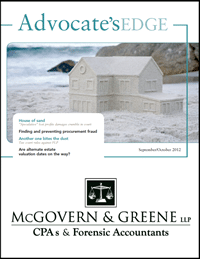 SEP/OCT 2012 Issue of Advocate’s Edge
SEP/OCT 2012 Issue of Advocate’s Edge
House of sand
“Speculative” lost profits damages crumble in court
Lost profits damages may seem straightforward. However, they’re anything but that when valuators must base their calculations on the projected profits of a new business. This article looks at one recent California case that illustrates how such a claim can crumble upon examination. The defendant won the case, but, as a result of its weak evidence to support its projected profits, saw its lost profits damages award severely slashed. A sidebar notes a similar fate regarding punitive damages.
Another one bites the dust
Tax court rules against FLP
A family limited partnership (FLP) can be a viable tax-advantaged method of handling assets — but only if it’s established and administered correctly. This article looks at an FLP that the IRS successfully challenged. It explains some of the specific factors that led the Tax Court to conclude that the decedent’s asset transfers were not the bona fide sales that would have qualified the FLP for favorable tax treatment.
Finding and preventing procurement fraud…
Purchasing departments can be fraud hotbeds. Without strong fraud control measures, companies can easily fall victim to fictitious vendor, kickback and other procurement schemes. This article describes red flags to look for internally, including payments to vendors that have been invented by employees, and also discusses preventive measures.
Are alternate estate valuation dates on the way?
The IRS has issued new proposed regulations on the election of alternate valuation dates for estates. If implemented, they could significantly affect the availability of alternate valuation dates when the value of an estate decreases after death. This article discusses Internal Revenue Code Section 2032(a), which allows executors to elect to value an estate on the date that’s six months after the date of death.
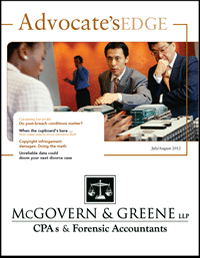 JUL/AUG 2012 Issue of Advocate’s Edge
JUL/AUG 2012 Issue of Advocate’s Edge
Calculating lost profits
Do post-breach conditions matter?
Recently, some breach of contract defendants have argued that poor market conditions subsequent to the alleged breach undermine plaintiffs’ claims for lost profits. This article looks at one lost-profits case in which the court didn’t agree, noting the “traditional rule” that lost profits damages are measured at the time of the breach. A sidebar discusses the distinction the court made in this case between direct lost profits and collateral lost profits.
Copyright infringement damages: Doing the math
Technological leaps and bounds made in the past decade have opened up a virtual playground for copyright infringers. But they may find themselves liable for significant damages down the road. This article talks about the potential liability under the Copyright Act and the Digital Millennium Copyright Act and the different approaches courts have used to compute losses resulting from infringement.
When the cupboard’s bare …
How fraud experts prove inventory theft
Inventory fraud is notoriously difficult to find and document. So if a client suspects an employee of stealing inventory, it’s important to get a fraud expert involved as quickly as possible. As this article notes, the expert may discover that goods have simply been misplaced. But if fraud is involved, experts look for irregularities in journal entries, vendor invoices and purchase orders, and they work with the company to confirm physical inventory.
Unreliable data could doom your next divorce case
This article examines a recent divorce dispute that illustrates how unreliable data can undermine an expert’s estimate. When a divorcing couple disagreed about the value of the business owned by the husband and his brother, the husband’s expert lowered his final estimate after making calculations based on the brother’s forecast. But an appeals court decided that a valuation “based on an off-the-cuff forecast by a nonexpert” didn’t provide a more accurate value than that generated exclusively from historical figures.
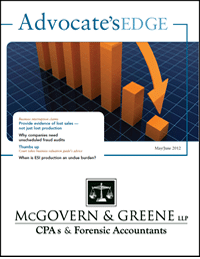 MAY/JUN 2012 Issue of Advocate’s Edge
MAY/JUN 2012 Issue of Advocate’s Edge
Business interruption claims
Provide evidence of lost sales — not just lost production
Whether caused by negligence, breach of contract, terrorism or “acts of God,” the temporary interruption of a business can be financially damaging. When a company tries to recoup its losses from its insurer or the responsible party, it needs solid, comprehensive expert testimony — or it risks losing its claim. This article examines a case in which a metals manufacturer sued its insurer when, following equipment failure, it wasn’t satisfied with the progress of its claim for losses. But its case suffered when it didn’t identify existing or potential sales, or produce evidence showing it could sell existing inventory. A sidebar shows how CPAs calculate lost sales.
When is ESI production an undue burden?
Electronically stored information (ESI) has moved to the forefront of discovery. Yet some attorneys still struggle with ESI production, including the rules for opposing a request. This article looks at a recent federal district court case illustrating just how high the hurdle can be to prove undue burden. When the defendant company didn’t assert any specific objection to the plaintiff’s request for production of documents, but produced the requested ESI in PDF format, it learned that that wasn’t sufficient.
Thumbs up
Court takes business valuation guide’s advice
Courts often expect business valuation experts to rely, at least in part, on the value of comparable entities when making their calculations. But in late 2011, the California Court of Appeals allowed a business valuation based on “rules of thumb” multiples, rather than comparables. As this article shows, an expert applied a 42% multiplier to the plaintiff’s physical therapy business; but the appeals court, following a business reference guide, supported a 100% multiplier, citing various marketability factors and the business’s health.
Why companies need unscheduled fraud audits
Because regularly scheduled audits give cheating employees time to hide their crimes, auditors typically don’t find occupational fraud schemes. That’s where unscheduled fraud audits come in. This article explains fraud detection methods and how surprise audits can both detect and deter employee theft.
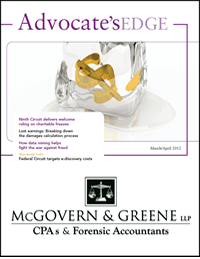 MAR/APR 2012 Issue of Advocate’s Edge
MAR/APR 2012 Issue of Advocate’s Edge
Ninth Circuit delivers welcome ruling on charitable freezes
Now is an appealing time to make large gifts, but IRS challenges to the valuation of transferred assets could result in unexpected gift taxes. However, the Ninth U.S. Circuit Court of Appeals recently favored a taxpayer who’d implemented a gifting strategy to avoid additional taxes from an IRS revaluation: the charitable freeze. This article discusses this strategy and why the court decided that the IRS erred in blocking a gift tax deduction. A sidebar talks about how the court expressly invited the U.S. Treasury Department to amend its regulations if it’s troubled by the consequences of the court’s decision.
How data mining helps fight the war against fraud
Fraud investigators use data mining techniques to extract and analyze digital data from databases. This article describes where the information comes from and how it’s extracted. Thorough analysis is as important, if not more so, than the collection of data; therefore, investigators look for specific red flags that might indicate underlying fraud.
New model order
Federal Circuit targets e-discovery costs
The Chief Judge of the U.S. Court of Appeals for the Federal Circuit has introduced a new model order for e-discovery. This article notes that, while the order was developed specifically for patent cases, it’s possible that it could also be adapted for less complex types of litigation in the future. Among other issues, the order addresses e-mail, search terms, and privilege and work product protections, with an eye toward reducing discovery expenses.
Lost earnings: Breaking down the damages calculation process
Lost earnings can be one of the more challenging categories of damages to calculate. Just as every employee is different, so too is the combination of base earnings, benefits and other factors that an expert must consider. For this reason, damages experts generally break the process into several steps, which include considering retirement and fringe benefits and anticipating disputes.
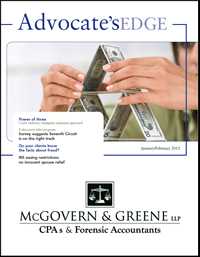 JAN/FEB 2012 Issue of Advocate’s Edge
JAN/FEB 2012 Issue of Advocate’s Edge
Power of three
Court endorses triangular valuation approach
This article discusses a recent Tax Court case. After a company announced a recapitalization agreement, a shareholder filed suit, alleging that the agreement significantly undervalued the company and therefore improperly transferred wealth and voting power from its minority shareholders to its primary debt holder. The plaintiff’s expert arrived at an exceptionally high value using only the discounted cash flow method. But the court rejected this approach, placing greater credence on the defense’s use of multiple valuation techniques.
E-discovery pilot program
Survey suggests Seventh Circuit is on the right track
Almost three years ago, the Seventh Circuit Court of Appeals launched its multiphase Electronic Discovery Pilot Program. The program is intended to develop, evaluate and improve pretrial litigation procedures that ensure fairness and justice for all parties while reducing the rising cost and burden of electronic discovery. This article looks at the principles of the program and the findings thus far.
Do your clients know the facts about fraud?
Employee fraud remains a persistent concern for American companies, yet too many owners believe that it can’t happen to them. Small businesses, in particular, foster environments of trust, and their owners might not even recognize criminal activities — until the company suffers financial losses. This article summarizes findings of the Association of Certified Fraud Examiners’ (ACFE’s) biennial survey of fraud experts, including the types of fraud that present the biggest challenges to specific kinds of businesses.
IRS easing restrictions on innocent spouse relief
Years after a divorce decree has been signed and entered, an innocent former spouse could end up on the hook for the misstatement of taxes on a couple’s joint tax return. In such a case, the nonresponsible spouse must request innocent spouse relief from the IRS. This article explains that the IRS time limit on certain relief requests was recently expanded, and many spouses — divorced or not — who previously were denied relief because of the limit may now qualify.
This publication is distributed with the understanding that the author, publisher and distributor are not rendering legal, accounting or other professional advice or opinions on specific facts or matters, and, accordingly, assume no liability whatsoever in connection with its use.
GFAS Advocate's Edge Archives
Expert Forensic Accounting Services
Chicago | Las Vegas
FORENSIC ACCOUNTING
SERVICES
Insurance Claims
Accounting Investigations
Mergers & Acquisitions
Due Diligence Reviews
Dispute Advisory Services
Special Examinations
Contract Audits and Recoveries
LITIGATION SERVICES
Expert Witness Testimony
Commercial Damages
Shareholder/Partner Disputes
Bankruptcy and Insolvency
CPA Malpractice Claims
Contract Disputes
Estate and Trust Disputes
Data Mining & Electronic Discovery
FRAUD EXAMINATIONS

